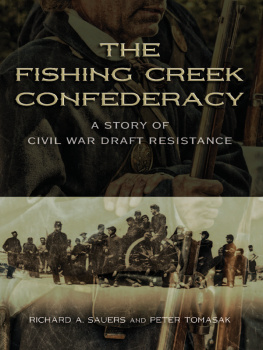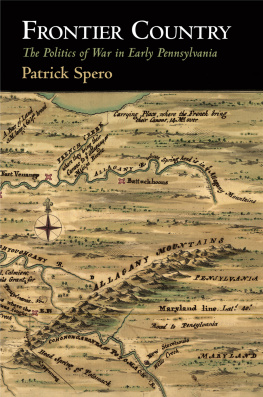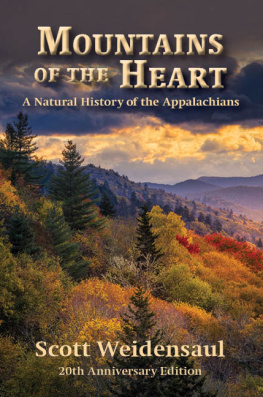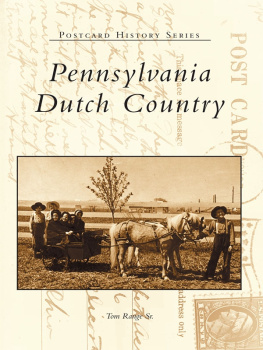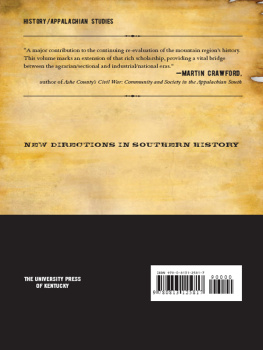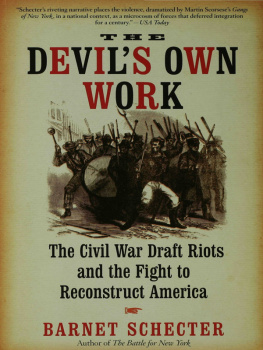DESERTER COUNTRY
Deserter Country
Civil War Opposition in the Pennsylvania Appalachians
Robert M. Sandow

Copyright 2009 Fordham University Press
All rights reserved. No part of this publication may be reproduced, stored in a retrieval system, or transmitted in any form or by any meanselectronic, mechanical, photocopy, recording, or any otherexcept for brief quotations in printed reviews, without the prior permission of the publisher.
Fordham University Press has no responsibility for the persistence or accuracy of URLs for external or third-party Internet websites referred to in this publication and does not guarantee that any content on such websites is, or will remain, accurate or appropriate.
Library of Congress Cataloging-in-Publication Data
Sandow, Robert M.
Deserter country : Civil War opposition in the Pennsylvania Appalachians/
Robert M. Sandow.1st ed.
p. cm.(The Norths Civil War)
Includes bibliographical references and index.
ISBN 978-0-8232-3051-8 (cloth : alk. paper)
1. PennsylvaniaHistoryCivil War, 18611865Protest movements.
2. PennsylvaniaPolitics and government18611865. 3. Appalachians
(People)PennsylvaniaHistory19th century. 4. Appalachians
(People)PennsylvaniaPolitics and government19th century. 5. United
StatesHistoryCivil War, 18611865Protest movements. 6. United
StatesPolitics and government18611865. I. Title.
F153.S24 2009
973.712097487dc22
2008050384
Printed in the United States of America
11 10 09 5 4 3 2 1
First edition
For Miyuki and Mark
Contents
Figures and Tables
Figures
Tables
Acknowledgments
A project of this length is sustained by the guidance, friendship, and support of many people. While I am indebted to a multitude of friends, colleagues, mentors, and institutional staff, any faults of this work are my own.
I am sincerely thankful for the vital funding I received through the George and Ann Richards Civil War Era Center and the Department of History at the Pennsylvania State University. In addition, I am grateful to the Pennsylvania Historical and Museum Commission, Harrisburg, for a fellowship to research at the Pennsylvania State Archives as a scholar-in-residence. I also wish to acknowledge the invaluable assistance from many archivists and librarians who guided me through my labors, with special mention to those at the National Archives and Records Administration and the Clearfield County Historical Society. Richard T. Hughes of Clearfield was especially helpful in sharing his information on county history, introducing me to local people, and including me in remarkable events such as the commemorative re-enactment of Bloody Knox.
At Penn State, I was aided by many encouraging professors and graduate colleagues. Professors Sally McMurry, Gregory Smits, and Deryck Holdsworth served as members of my dissertation committee. Professor Mark E. Neely, Jr. read the Introduction and critically, offering keen insight and suggestions. Dr. Neely is the consummate iconoclast, driven to challenge even the most entrenched paradigms against the weight of historical evidence. He is a model historian in many ways. I am also obliged to Professors Carol Reardon and Gary W. Gallagher for their rigorous models of teaching and scholarship. My greatest intellectual debt is to my advisor, Professor William A. Blair, whom I consider a mentor and friend. His careful reading, thoughtful analysis, and intellectual prodding have improved this project measurably. I cannot imagine having completed this work without his generous direction and encouragement.
I owe special thanks for the help of graduate friends at Penn State. Jonathan Berkey, Christina Ericson, Barbara Gannon, Tristan Jolivette, David Smith, and Mike Smith gave useful critiques on portions of the manuscript. Fellow Gettys-burgian Scott Webster unselfishly opened his apartment to me on an extended research trip to Washington, D.C. Chris Ericson was an endless source of cheer during my studies. Andrew Slap helped me to survive graduate school and always lends his kindness and intellect to assist a friend. He listened and read about what he derided as my cowardly lumbermen long after the resolve of others had failed.
I thank Paul A. Cimbala of Fordham University, editor of Fordham University Presss series The Norths Civil War, for enthusiastically supporting this project through publication. I am also grateful to the careful editorial assistance of Eric Newman and Mildred Sanchez, the Presss managing editor and the books copy editor, respectively. In addition, I acknowledge the efforts of Daniel W. Crofts, of the College of New Jersey, who generously read the manuscript and made numerous helpful suggestions for its improvement.
Family members have made this project possible. I thank Nobuyuki and Hideko Ogihara for their generosity and kindness, overcoming the barriers of distance and language. Chris Galloway went beyond the duties of a brother and kindly read a chapter from my dissertation. Laurie Galloway probably wondered if I would ever finish but loved and encouraged me as a mother all the same.
I give my greatest thanks to Miyuki for her unending patience and understanding in the completion of this work. This project has spanned key milestones in my life, as I became a teacher, a husband, and the father of Mark Takumi. For all the moments lost to them in this research and for the many other ways my life is made better because of them, I dedicate this book to Miyuki and Mark.
DESERTER COUNTRY
Introduction
This work is a study of war opposition, an inner civil war, in the Pennsylvania Appalachians. It pursues the basic question why some rural northerners opposed the Civil War even to the point of violence. In its conception, it combines a regional study of the northern mountains with an examination into the causes and meaning of wartime protest. It argues that specific social, political, and economic factors contributed to the prevalence of antiwar attitudes there.
Although the Appalachian Mountains extend into the North, scholars of the Civil War have focused predominantly on their southern reachesa region noted for the development of thorny resistance to the rebel government. Scholars of the Confederate war have drawn increasing attention to the complex struggle between Unionists, the disaffected, and Confederate Loyalists, most notably in the mountainous border areas. The people of the southern Appalachians were divided in their loyalty to Confederate independence. On the periphery of state authority, these communities developed strong regional identities nurturing traditions of autonomy and local government. Kinship and community fashioned the hierarchy of their loyalty.
Wartime hardships intensified the internal divisions of the mountain South. Many southerners grew to resent the intrusion of the Confederate government with its increased demand for volunteers and seizure of military supplies. Yeomen farmers of the upland South lived more closely to the margins of subsistence, and the disruptions of labor and food threatened family survival. As border communities in the path of Union military advances, they faced additional pressures. When armies advanced and retreated, issues of loyalty had profound implications for the people who lived there. Soldiers on both sides justified the capture of food and sometimes the destruction of property belonging to the enemy. In the uncertainty of the Civil War, hardships and bitterness fractured neighborhoods into warring factions that continued their bloody feuds even after the armies departed.
Next page

